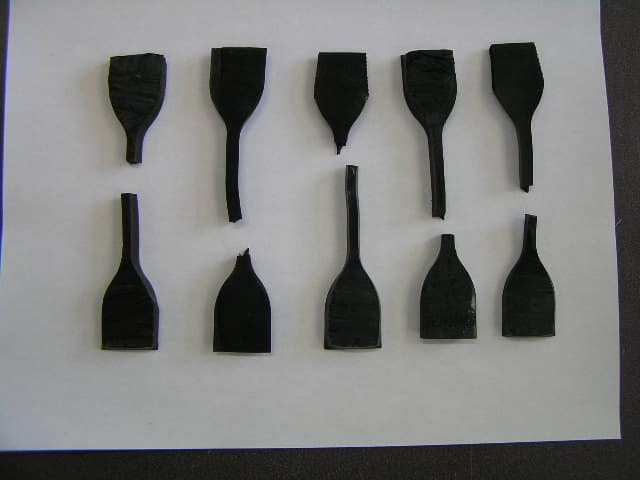ASTM D412
Standard Test Methods for Vulcanized Rubber and Thermoplastic Elastomers – Tension
At Micom Laboratories, we specialize in providing comprehensive ASTM D412 testing services to manufacturers across various industries, including aerospace, automotive, medical devices, and industrial manufacturing. As part of our physical and mechanical testing services of polymers, we assess the tensile properties of thermoplastic elastomers and vulcanized rubber to ensure they meet performance and regulatory requirements. Our ISO/IEC 17025 accreditation by A2LA ensures that our testing processes meet the highest standards of quality and reliability.
When your rubber or elastomer components need reliable performance validation, Micom Laboratories delivers precise, reliable ASTM D412 testing services to help ensure your products meet quality and regulatory requirements.
What is ASTM D412 Testing?
ASTM D412 is the industry standard test method for determining the tensile properties of vulcanized rubber, thermoplastic elastomers, and related materials. Using precision equipment and carefully prepared test specimens, our technicians measure how your materials perform under tension until the point of failure.
Unlike ASTM D638 (which focuses on rigid plastic testing), ASTM D412 is specifically designed for the unique stress-strain behavior of flexible elastomeric materials, providing insights into their performance in real-world applications.

Critical Properties Measured With ASTM D412
Our comprehensive ASTM D412 testing service provides detailed analysis of:
- Tensile Strength: The maximum stress your material can withstand before rupture
- Ultimate Elongation: How far your material stretches before breaking, expressed as a percentage of its original length.
- Modulus of Elasticity: The ratio of stress to strain in the elastic deformation phase, indicating material stiffness.
- Tensile Set: The permanent deformation remaining after a material has been stretched and allowed to retract.
- Stress-Strain Curves: Complete visualization of material behavior under tension

Why These Properties Matter
Understanding the tensile properties of polymers, such as elastomeric materials, is essential for:
- Product Development
Select optimal materials for your application requirements - Quality Assurance
Verify incoming materials meet your specifications - Regulatory Compliance
Document material properties for certification requirements
- Performance Prediction
Understand how materials will behave in intended applications - Failure Analysis
Identify material issues before they become costly product failures
Don't Leave Your Materials’ Performance to Chance.
Whether you need routine quality control testing or in-depth characterization to ASTM D412, our team is ready to help you evaluate your rubber and thermoplastic elastomers.
Our Testing Process
At Micom Laboratories, we follow a rigorous, standardized process, as described in ASTM D412 standard documentation, to evaluate the tensile properties of vulcanized thermoset rubbers and thermoplastic elastomers.
1. Specimen Preparation
- Our technicians carefully prepare specimens in the standardized dumbbell shape (typically Type C with 115 mm overall length, 25 mm gauge length, and 6 mm width).
- Each specimen’s thickness is precisely measured at three points within the gauge length, with the median value used for calculations.
- Multiple specimens are prepared from your material to ensure the statistical validity of results.
2. Conditioning
- All specimens undergo controlled environmental conditioning before testing.
- This critical step ensures consistency across all tests and accurately simulates real-world application conditions.
- Our climate-controlled facilities maintain the exact temperature and humidity levels specified by ASTM D412 guidelines.
3. Testing Execution
- Specimens are carefully mounted in specialized grips on our calibrated universal testing machine.
- Precise alignment ensures even stress distribution throughout the test.
- A constant crosshead speed of 500 ± 50 mm/min applies uniaxial tensile force.
- Sophisticated sensors continuously capture force and elongation data until specimen rupture.
- Real-time monitoring ensures test validity throughout the procedure.
4. Comprehensive Analysis
- Our materials scientists analyze the complete stress-strain curve to extract key performance indicators.
- We determine critical properties including tensile strength, elongation at break, modulus values at various elongations, and tensile set.
- Statistical analysis across multiple specimens ensures data reliability.
- Results are compiled into detailed, easy-to-understand reports tailored to your specific requirements.
This meticulous approach to ASTM D412 testing gives manufacturers the confidence to make critical decisions about material selection, quality control, and product development, based on precise and reliable data.
Industries We Serve
Our ASTM D412 testing services support manufacturers across diverse industries.
Aerospace
Ensuring elastomers such as seals and vibration control components meet stringent performance standards for aircraft applications.
Automotive
Testing materials for components like seals, gaskets, vibration dampers, hoses, and belts.
Medical Devices
Evaluating materials used in medical tubing, seals, and other critical components.
Industrial Manufacturing
Assessing the durability and performance of materials used in machinery and equipment.
The Micom Advantage

ISO/IEC 17025 Accredited by A2LA
Our laboratory maintains rigorous quality standards with A2LA accreditation, ensuring our test results are recognized throughout North America and internationally.

Expert Team with Advanced Equipment
Our materials experts have decades of combined experience in polymer testing, utilizing state-of-the-art machinery that delivers precise, reliable results. We provide not just data, but valuable insights into your material performance.

Customized Testing Approach
We tailor test conditions to replicate specific environmental factors relevant to your application, helping you understand how your materials will perform in real-world scenarios.

Comprehensive, Actionable Reporting
Receive detailed, easy-to-understand reports that include all relevant test data, statistical analysis, and graphical representations of results—specifically designed to support your decision-making process.
Let Us Help You Validate Your Materials
Trust Micom Laboratories for trusted ASTM D412 testing services that help ensure your rubber and elastomeric materials meet the demands of your most critical applications.
For manufacturers requiring additional testing, such as hardness testing (ASTM D2240), tear strength testing (ASTM D624), accelerated aging, UV Testing, and any other polymer testing, Micom’s testing experts are available to discuss any complementary testing you may need.
Contact us today to discuss your testing requirements and customization options or request a quote if you are ready to take the next steps.
Frequently Asked Questions About ASTM D412
What are the differences between ASTM D412 and ASTM D638 for material testing?
Both ASTM D412 and ASTM D638 are widely used tensile testing standards, but they differ in their scope and application:
- ASTM D412 is specifically designed for vulcanized rubber, thermoplastic elastomers, and flexible materials, focusing on properties such as elongation, tensile strength, and modulus of elasticity. The materials tested under ASTM D412 exhibit high stretchability and require specialized grips to prevent slippage.
- ASTM D638 applies to rigid plastics, measuring properties such as yield strength, elongation at break, and tensile modulus. Because plastics behave differently under tension, this test method uses specimens of varying geometries with specific clamping techniques.
If your material is flexible and stretchable, ASTM D412 is the correct choice. If it’s rigid and brittle, ASTM D638 is more appropriate. Our team can help you determine which test best suits your material and application needs.
How does environmental conditioning impact test results?
Environmental conditions can significantly affect the tensile properties of vulcanized rubber and thermoplastic elastomers, making conditioning a critical step in ASTM D412 testing.
- Temperature: Elevated temperatures can make elastomers softer and more flexible, reducing tensile strength and increasing elongation. Cold temperatures, on the other hand, can make them brittle and more prone to failure.
- Humidity: Moisture absorption can alter material properties, particularly in hygroscopic elastomers or materials containing additives that interact with humidity.
- Aging & UV Exposure: Long-term exposure to environmental factors may degrade elastomeric materials, leading to changes in tensile properties over time.
To ensure accurate results, we follow ASTM D412 environmental conditioning guidelines, exposing specimens to controlled conditions before testing. If your materials will be used in extreme conditions, we can simulate those environments to provide application-specific data.
What is the required specimen shape and size for ASTM D412 testing?
ASTM D412 specifies different specimen geometries depending on the test method used:
- Test Method A (Dumbbell Specimens) – The most commonly used method, requiring a dumbbell-shaped specimen.
- The standard Type C specimen is:
- Overall Length: 115 mm (4.5 in)
- Gauge Length: 25 mm (1 in)
- Width: 6 mm (0.25 in)
- This shape ensures uniform stress distribution during testing.
- The standard Type C specimen is:
- Test Method B (Ring Specimens) – Used for specialized applications, where a continuous ring sample is tested under tension.
Can you customize the testing conditions based on my application needs?
Yes, at Micom Laboratories, we offer customized ASTM D412 testing to match the specific conditions your materials will encounter in real-world applications.
We can adjust test parameters such as:
- Strain rate: Higher or lower speeds depending on the expected use of the material.
- Temperature: Testing at elevated or reduced temperatures to mimic real-world environments.
- Humidity conditions: Evaluating material behavior under varying moisture levels.
- Aging simulations: Exposing materials to accelerated aging before testing to measure long-term performance.
Our goal is to provide relevant, application-specific data that helps manufacturers optimize their material selection, product design, and quality control processes.
Can ASTM D412 testing be combined with other mechanical tests, such as shear or compression testing?
Yes, ASTM D412 tensile testing is often combined with other mechanical tests to gain a more comprehensive understanding of a material’s behavior. Depending on your application, we can pair ASTM D412 with:
- Shear Testing: Evaluates how materials behave under parallel forces, critical for adhesives and laminated elastomers.
- Compression Testing: Measures how an elastomer deforms under compressive loads, relevant for gaskets, seals, and shock-absorbing materials.
- Tear Resistance Testing (ASTM D624): Assesses the tear strength of vulcanized rubber and thermoplastic elastomers, important for high-stress applications.
- Hardness Testing (ASTM D2240 – Durometer Hardness): Determines material stiffness to complement tensile results.
If your product requires multi-faceted mechanical characterization, we can design custom test plans tailored to your needs.
Do you offer environmental aging or durability testing alongside ASTM D412?
Yes, Micom Laboratories offers accelerated aging testing and UV exposure testing (ASTM G154 / ASTM D4329) alongside ASTM D412 tensile testing to evaluate how materials degrade over time when exposed to specific environmental conditions.

